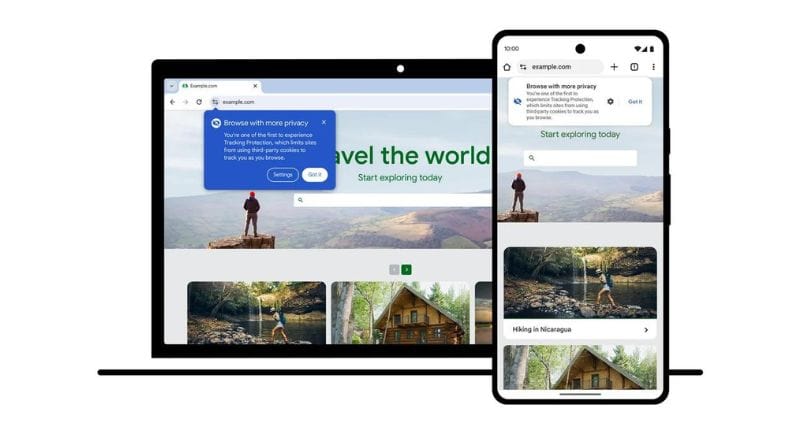Google has unveiled its plans to roll out Tracking Protection as it prepares to phase out third-party cookies in the second half of 2024.
Tracking Protection is a new feature that the tech giant says limits cross-site tracking by restricting website access to third-party cookies by default.
The roll-out will begin on January 4 with 1% of Chrome users globally in order for developers to test their readiness for a web without third-party cookies, subject to addressing any competition concerns from the UK’s Competition and Markets Authority.
Anthony Chavez, VP of Privacy Sandbox, explained that participants in Tracking Protection will be selected randomly and will be notified when they open Chrome on either desktop or Android, in a recent blog post. While browsing, third-party cookies will be restricted by default, limiting the ability to track you across different websites.
He noted that if a site doesn’t work without third-party cookies, Chrome will recognise any issues with the page and prompt the option of temporarily re-enabling third-party cookies for that website from the eye icon on the address bar.
Chavez said: “As we work to make the web more private, we’ll provide businesses with tools to succeed online so that high quality content remains freely accessible — whether that’s news articles, videos, educational information, community sites or other forms of web content.
“With Tracking Protection, Privacy Sandbox and all of the features we launch in Chrome, we’ll continue to work to create a web that’s more private than ever, and universally accessible to everyone,” he added.
The tech giant has also built new tools for sites that support key use cases, such as Chrome DevTools Network panel and Related Website Sets, and provided time for developers to make the transition.
Google has delayed the phasing out of third-party cookies twice in recent years before confirming in July 2022 that it would be it would going ahead in the second half of 2024.
Chavez said, at the time, the most consistent feedback was that more time was needed to test and evaluate new Privacy Sandbox technologies before deprecating third-party cookies in Chrome.
“This feedback aligns with our commitment to the CMA to ensure that the Privacy Sandbox provides effective, privacy-preserving technologies and the industry has sufficient time to adopt these new solutions,” he added.
Since then, Google has gone on to launch a global post-cookie technology readiness program in partnership with GroupM.
The global initiative brings together GroupM clients to accelerate their understanding of Google Privacy Sandbox APIs and their use in advertising.
Participating GroupM clients will get access to the learning program to assess and improve their post-third-party cookie deprecation readiness in a real-life environment, using their own products and audiences.
Read more: GroupM and Google launch post-cookie technology readiness program
